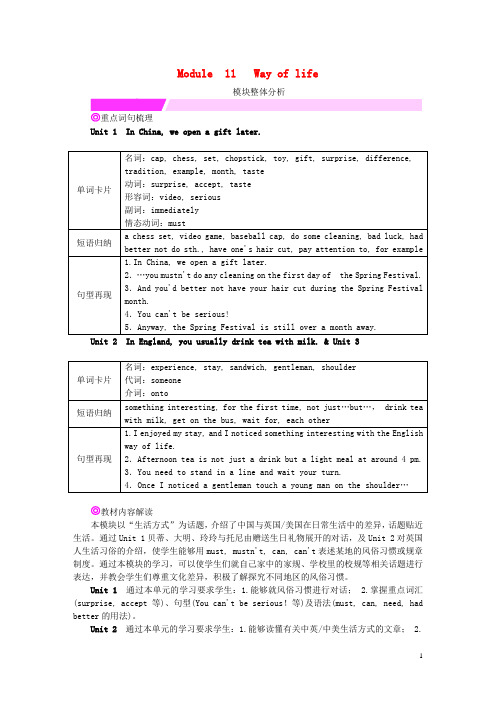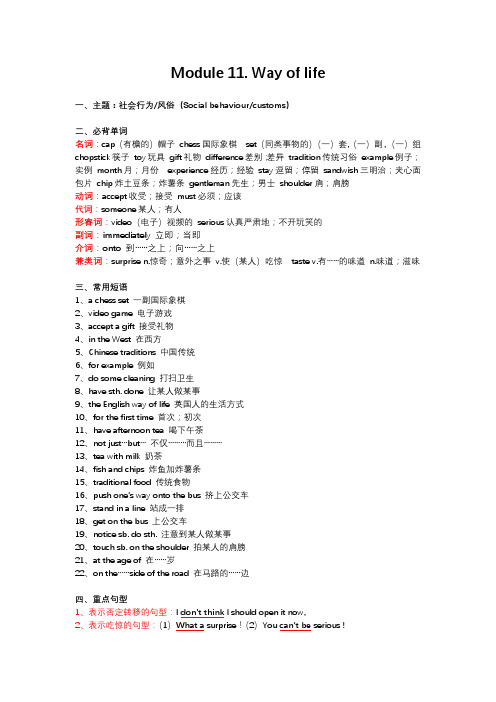【配套K12】[学习]八年级英语上册 Module 11 Way of life知识点归纳总结 (新
八年级英语上册 Module 11 Way of life模块整体分析 (新版)外研版

Module 11 Way of life模块整体分析Unit 1In China, we open a gift later.Unit 2In England, you usually drink tea with milk. & Unit 3本模块以“生活方式”为话题,介绍了中国与英国/美国在日常生活中的差异,话题贴近生活。
通过Unit 1贝蒂、大明、玲玲与托尼由赠送生日礼物展开的对话,及Unit 2对英国人生活习俗的介绍,使学生能够用must, mustn't, can, can't表述某地的风俗习惯或规章制度。
通过本模块的学习,可以使学生们就自己家中的家规、学校里的校规等相关话题进行表达,并教会学生们尊重文化差异,积极了解探究不同地区的风俗习惯。
Unit 1通过本单元的学习要求学生:1.能够就风俗习惯进行对话; 2.掌握重点词汇(surprise, accept等)、句型(You can't be serious!等)及语法(must, can, need, had better的用法)。
Unit 2通过本单元的学习要求学生:1.能够读懂有关中英/中美生活方式的文章; 2.熟练运用词汇(experience, for the first time等)、句型(I noticed…等)及语法(must, can, need的用法)。
Unit 3通过本单元的练习要求学生:1.进一步巩固can, must, need的用法; 2.了解国外的生活习惯,尊重文化差异,并为去中国家庭做客的外国朋友提建议。
1.—Happy birthday, Lingling.—Here's your gift.—Oh, you remembered! What a surprise!2.—Oh, thank you. I really wanted one.—We're happy you like it.3.Tell me more.4.It's bad luck!5.You can't be serious!6.Perfect! They taste great.7.Excuse me! Are you waiting for this bus?1.掌握情态动词must, can, need等的用法。
Module11WayoflifeUnit1教学课件英语八年级上册【04】

典。)玲玲:哦,谢谢。
(Lingling opens her
我很想要一本词典。贝
present and finds a
蒂:你喜欢我们就高兴。
dictionary.)
Lingling: Oh, thank you. I
really wanted one.
Tony: I noticed another 托尼:我注意到另一个
the Spring Festival month.
Now, let’s learn some language points from this dialthday, Lingling.
这是Here开头的倒装句。当
Daming: Here's your gift. here,there在句首且主语是
Betty: We're happy you like it.
Tony: I noticed another 泛指“另一个”,常用于三者
difference. In China, you 或以上中的另一个;another后
accept a gift with both 可直接跟单数名词,也可单独
hands. But in usually don't
remembered! What a
真是个惊喜!托尼:你
surprise!Tony: You can open 可以打开它!玲玲:我
it!Lingling:I don't think I 认为我现在不应该打开
should open it now. In
它。在中国,我们晚些
China, we open a gift later. 时候打开礼物。
Lingling:So what do I do? 情况下可以通用。
八年级英语上册Module11Wayoflife全模块知识点素材新版外研版7

Module 11 Unit 1 1、 I don ’ t think I should open it. 否认前置其反义疑问句为:should I?2、 immediately adv. 立刻地immediate adj. 立刻的3、 needn't 没必需= don ’ t have to4、 notice v.注意到5、 accept v.接受receive v.收到6、 with both hands7、 pay attention ton.通知用双手注意8、 be interested to do sth.感兴趣做某事9、 tradition n.传统traditional adj.传统的10、 For example比如11、 mustn't必定不可以够(表严禁)12、 on the first day of the Spring Festival13、 break sth.打坏东西,折断14、 use sth. for...用来做use sth. to do sth.在春节的第一天15、 had better (not) do最好做/最好不要做16、 have your hair cut理发have sth. Done使被做= get sth. Done17、 You can ’ t be serious!你不是仔细的吧!18、 over a month away还有一个多月才到19、 celebrate v.庆贺Module 11 Unit 21、enjoy my stay过的很快乐2、for the first time第一次at first开初,刚开始的时候first / first of all第一do sth. first先做某事3、get to know开始熟习4、复习名字first name / given name 名last name / family name5、a light meal一顿便餐姓6、fish and chips7、on the high street8、push one ’s way9、stand in a line10、wait one ’ s turn 炸鱼和炸薯条在大街上挤站成一排轮番11、touch sb. on the shoulder 碰某人的肩膀Grammar; must, can, need一、 must1.表示“一定,必定要”用于必定句、否认句和疑问句。
外研版八年级英语上册Module 11讲义(含导入及详细知识点)

M o d ule 11.Way of l i fe一、主题:社会行为/风俗(Soc ial behaviour/custo ms)二、必背单词名词:cap(有檐的)帽子 chess国际象棋se t(同类事物的)(一)套,(一)副,(一)组chopst i ck筷子 toy玩具g i f t礼物 di f fe rence 差别;差异t rad i t ion 传统习俗exa mple例子;实例month 月;月份exper ience 经历;经验 s tay逗留;停留 sandwish三明治;夹心面包片ch ip炸土豆条;炸薯条gent l e man 先生;男士 shou lder肩;肩膀动词:accept收受;接受must必须;应该代词:so meone 某人;有人形容词:v ideo(电子)视频的 serious认真严肃地;不开玩笑的副词:im mediat e ly立即;当即介词:onto 到……之上;向……之上兼类词:surpr i se n.惊奇;意外之事 v.使(某人)吃惊tas te v.有……的味道n.味道;滋味三、常用短语1、a chess se t一副国际象棋2、v ideo ga me 电子游戏3、accept a g i f t接受礼物4、in the West在西方5、Chinese t rad i t i ons中国传统6、for exa mple例如7、do so me c leaning 打扫卫生8、have s th. done 让某人做某事9、the Eng l i sh way o f l i fe英国人的生活方式10、for the f i r s t t i m e 首次;初次11、have a f te rnoon tea喝下午茶12、not jus t…but…不仅………而且………13、tea w i th mi lk 奶茶14、f i sh and ch ips炸鱼加炸薯条15、t rad i t iona l food 传统食物16、push one’s way onto the bus挤上公交车17、stand in a l ine 站成一排18、get on the bus上公交车19、not ice sb. do s th.注意到某人做某事20、touch sb. on the shou lder拍某人的肩膀21、at the age of 在……岁22、on the……s ide of the road 在马路的……边四、重点句型1、表示否定转移的句型:I don’t t hink I shou ld open i t now,2、表示吃惊的句型:(1)W hat a su rp r i se!(2)You can’t be ser ious!3、提出建议的句型:(1)And you mustn’t break anyth ing.(2)And you’d better not haveyour ha i r cut dur ing the Spr ing Fes t i va lm o nth.(3)Let’s ce lebrate L ing l ing’s b i r t hday f i r s t!五、模块语法情态动词 must、can 和 need 的用法(You must say Mr or Mrs when you meet so meone for the f i r s t t ime./You can take i t away./ You needn’t wa i t!)M o d ule 11.W a y of l i fe详细笔记1.Here’s your g i f t.这是给你的礼物。
八年级英语上册 Module 11 Way of life Unit 1 In China,we o

Betty: Yes, an English dictionary. She______lookup new words in it.
Task3.Listento A3andchoose the best answer.
1.Why does lingling get a gift? A. It’s her birthday. B. Spring Festival
tradition,for example,serious.
2.能熟练的运用can,must,mustn’t来表达意愿。
3.学习西方的一些传统,对比东西方传统的不同。
学习过程
备注
课前自学
Ⅰ.看音标,写单词。
1.[kæp]2.[tʃes]3.['tʃɔpstik]4.[tɔi]5.['vidiəu]
6.[ɡift]7.[sə'praiz] 8.[i'mi:diətli] 9.['difərəns] 10. [ək'sept]
2.在春节的第一天,你一定不能大扫除。
_______________________________________________________________________
3.你最好不要在春节的那个月理发。
_______________________________________________________________________
Task2.According to the dialogue on P88, finish the exercises.
1.”you needn’t wait.“ means_____
英语外研八年级上册Module 11 Way of life

T
We visited some friends and had afternoon tea.
② Afternoon tea is just a drink.
F
Afternoon tea is not just a drink but a light meal...
③ They had it at around 5 pm.
.
a. A kind of traditional food. c. Waiting for the bus.
a
c
b. Meeting someone.
b
d. Afternoon tea.
d
1. Read paragraph(段落) 2 and complete the passage.
If you meet someone for the first time, you musasyt Mr or
4. first name 意为“名,西方人名的第一个字”, 也叫
做given name
5. 短语get to do sth. 意为“逐渐开始做某事” 例:After travelling in Chengdu for a week, I get to
like this city.
This is Stephen Hawking.
tea with milk.
Words and exprissions
experience stay someone for the first time sandwich fish and chip onto gentleman shoulder
n. 经历,经验 n. 停留,逗留 pron. 某人,有人 首次,初次 n. 三明治 炸鱼加薯条 prep. 向...之上,到...之上 n. 先生,男士,绅士 n. 肩,肩膀
外研版八年级英语上册Module 11讲义(含导入及详细知识点)

Module 11. Way of life一、主题:社会行为/风俗(Social behaviour/customs)二、必背单词名词:cap(有檐的)帽子chess国际象棋set(同类事物的)(一)套,(一)副,(一)组chopstick筷子toy玩具gift礼物difference差别;差异tradition传统习俗example例子;实例month月;月份experience经历;经验stay逗留;停留sandwish三明治;夹心面包片chip炸土豆条;炸薯条gentleman先生;男士shoulder肩;肩膀动词:accept收受;接受must必须;应该代词:someone某人;有人形容词:video(电子)视频的serious认真严肃地;不开玩笑的副词:immediately 立即;当即介词:onto 到……之上;向……之上兼类词:surprise n.惊奇;意外之事v.使(某人)吃惊taste v.有……的味道n.味道;滋味三、常用短语1、a chess set 一副国际象棋2、video game 电子游戏3、accept a gift 接受礼物4、in the West 在西方5、Chinese traditions 中国传统6、for example 例如7、do some cleaning 打扫卫生8、have sth. done 让某人做某事9、the English way of life 英国人的生活方式10、for the first time 首次;初次11、have afternoon tea 喝下午茶12、not just…but… 不仅………而且………13、tea with milk 奶茶14、fish and chips 炸鱼加炸薯条15、traditional food 传统食物16、push one’s way onto the bus 挤上公交车17、stand in a line 站成一排18、get on the bus 上公交车19、notice sb. do sth. 注意到某人做某事20、touch sb. on the shoulder 拍某人的肩膀21、at the age of 在……岁22、on the……side of the road 在马路的……边四、重点句型1、表示否定转移的句型:I don’t think I should open it now,2、表示吃惊的句型:(1)What a surprise!(2)You can’t be serious !3、提出建议的句型:(1)And you mustn’t break anything.(2)And you’d better not have your hair cut during the Spring Festivalmonth.(3)Let’s celebrate Lingling’s birthday first !五、模块语法情态动词must、can和need的用法(You must say Mr or Mrs when you meet someone for the first time./You can take it away./ You needn’t wait!)Module 11.Way of life详细笔记1.Here’s your gift.这是给你的礼物。
- 1、下载文档前请自行甄别文档内容的完整性,平台不提供额外的编辑、内容补充、找答案等附加服务。
- 2、"仅部分预览"的文档,不可在线预览部分如存在完整性等问题,可反馈申请退款(可完整预览的文档不适用该条件!)。
- 3、如文档侵犯您的权益,请联系客服反馈,我们会尽快为您处理(人工客服工作时间:9:00-18:30)。
精品K12教育教学资料 精品K12教育教学资料 Module11 Way of life
Unit1 In China, we open a gift later. 1.It’s cool to wear a cap back-to-front.把鸭舌帽前后反过来戴很酷。 2.If she is interested in playing chess, it’s a good idea to choose a chess set as a present. 3. We Chinese usually have meals with chopsticks/ while Westerners(西方人) use knives and forks for meals. This pair of chopsticks is pretty nice.(谓语是由pair决定的) A knife and fork ___ on the table now. (is) a knife and fork 一副刀叉表示一个整体,用单数。 4.A bar of chocolate is a perfect choice for those who prefer(更喜欢) sweet food. 5.Students need to look up new words in dictionaries to improve their study. 6. Little babies would like to play with toys. 7. Video games are not popular with teenagers any longer now. 现在电子游戏不再受青少年欢迎了。 8. Here’s your gift. Here’s the change(找头,零钱)/money. Here are some flowers for you. 9. What a big surprise! n. 1)in surprise “惊奇地”常位于动词之后作状语,表示方式。eg. John turned around and looked at me in surprise. 约翰转过身来,惊奇地望着我。 2)to one's surprise “使某人吃惊的是”、“出乎意料地”,常位于句首,作状语,表示行为的结果。 eg: To my surprise, the door was unlocked.使我吃惊的是,门没有锁。 surprised adj.人做主语,强调人的心理,“感到吃惊的” surprising adj.物做主语或修饰物,“令人吃惊的” 试比较:a surprising look 一个令人吃惊的表情 a surprised look一个吃惊的表情 3)be surprised at 对……感到惊奇 表示某种情绪、心情的起因时,常用at…这一介词短语,表示“听到…”或“看到…而…” eg:She was surprised at the news. 4)be surprised to do sth. 做某事感到惊讶 She was surprised to hear the news. 5)be surprised that + 从句 I was surprised that he died from an accident. 10.immediately=at once=right now=right away an immediate reply 立即回复 11.You must use both of the hands to accept a present. (both这里是pron. 做宾语) =You must accept a gift with both hands. (both这里是adj. 做形容语) Both of them are married. (both这里是pron. 做主语) Her parents are both doctors and they both work hard. They can both swim. (前一个both是adj. 做定语,后一个both是pron.做they的同位语) ( both/all和频度副词、also、probably的位置一样,放在实义动词前,情态动词、be动词或助动词后) 反义词 neither 两者都不 Neither of them is able to work out the math problem. (谓语用单数) neither… nor… 既不…也不… He can neither sing nor dance. (连接两个动词做谓语) The weather in Kunming is neither too cold nor too hot all year around. (连接两个形容词做表语) Neither you nor I am a foreigner. (连接两个代词或名词做主语,谓语采用就近原则) all反义词 none 三者及以上 12. I don’t think I should open it now. (否定前移) 我想我现在不应该打开它。 I don’t believe he is telling the truth. 我认为他不是在说实话。 13.You needn’t wait. =You don’t need to wait. Just wait and see! 到时候你就知道了。 can’t wait to do sth.迫不及待干某事 He couldn’t wait to open the box. can’t help doing sth. 情不自禁干某事 He couldn’t help laughing when he heard the joke. 14.The way of life in China is quite different from that in Britain.(与…截然不同) There are many differences between the way of life in China and that in Britain. 15. pay attention to 注意,留心 (to是介词,后接名词、代词宾格或动名词) We have paid much attention to health care in recent years.近年来,我们已经非常重视医疗保健了。 pay no/little attention to 对…不重视 You’d better pay more attention to taking good care of yourself. 16.be interested in (doing) sth 精品K12教育教学资料 精品K12教育教学资料 be interested to do sth. 17. 区分for example, such as和like for example一般只以同类事物或人中的“一个”为例,作插入语,用逗号隔开,可置于句首、句中或句末。 (1) For example, air is invisible. (看不见的) (2) He,for example,is a good student. such as用来列举同类人或事物中的几个例子。 (3)Some of the European languages come from Latin,such as French,Italian and Spanish. 有些欧洲语言来源于拉丁语,例如,法语、意大利语和西班牙语。 (4) Boys such as John and James are very friendly. like也常用来表示举例,可与such as互换。但such as用于举例可以分开使用,此时不可与like互换。 (5)Some warm-blooded animals,like/such as the cat,the dog or the wolf,do not need to hibernate. 一些温血动物,像猫、狗和狼都不需要冬眠。 (6)He has several such reference books as dictionaries and handbooks. 他有几本像字典、手册之类的参考书。 18.You mustn’t do any cleaning or break anything on the first day of the Chinese New Year/ the Spring Festival because it means bad luck/ it’s unlucky. do some cleaning/washing/reading/shopping sightseeing/cooking 19.You must use red paper for hongbao because it’s lucky/ red means good luck. 20.have one’s hair cut = have a haircut (cut-cut-cut cutting) cut down 砍伐(树木);削减(数字、数量等) They’ve cut down too many trees. You should cut down your composition within 500 words. 你应该把作文的字数减少至500字以内。 21. during the Spring Festival month during the Christmas season at Spring Festival/ Christmas on the first day of the Spring Festival on Christmas Day/Eve 22.You can’t be serious. 你不可能当真的吧。 =You must be joking/kidding. Take it easy./ Don’t worry. There’s nothing serious with your neck.别担心/紧张,脖子没什么大碍。 The situation is becoming serious. She is serious with her work.她对工作很认真。 He is seriously/badly hurt. Bad luck! 23. celebrate vt. 庆祝 They had a big party to celebrate his birthday. Grammar: must 的用法 1) 表示主观的义务和必要,主要用于肯定句和疑问句,意思为 “必须……,得……,要……”;由must引起的疑问句,肯定回答要用must,否定回答要用needn’t,意思是“不必”;must的否定形式mustn’t表示禁止,意思是“不能,不许”。 —Must I finish the task right now? —No, you needn’t. You mustn’t come here without permission. 没有允许你不准来这。 2) 表示肯定的猜测,常用于肯定句中,意为 “一定是,必然……”。 Your sister must be a doctor in this hospital. He must be reading newspapers in the reading room now.(正在进行的猜测) have to 与must的区别 两者都表示“必须”,但must侧重于说话者的主观看法,认为有必要或有义务去做某事;have to侧重于客观需要,含有“不得不,被迫”之意。 All passengers must wear seat belts. 系安全带 My bike was broken yesterday, so I had to walk to school. can 的用法 can的否定形式为cannot,缩写为can't。 1) 表示能力 I can’t swim. Can you drive? 注意:can表示能力可与be able to互换使用,且后者有更多的时态,be able to常被用来表示can所不能表示的将来或完成的概念。 They will be able to run this machine on their own in three months. 2) 表示可能性,意思是:可以,可能。 That big cinema can seat/hold 2,000 people. He can be very friendly at times. 他有时可能非常友善。 3) 表示允诺,意思是:可以,能够,相当于may。 You can read the book when I have finished it. Can I have a look at your pen? 4) 表示惊异、不相信、猜测等(用于疑问句、否定句或感叹句中),意思是:会,可能。 This can’t be true. 这不可能是真的。
